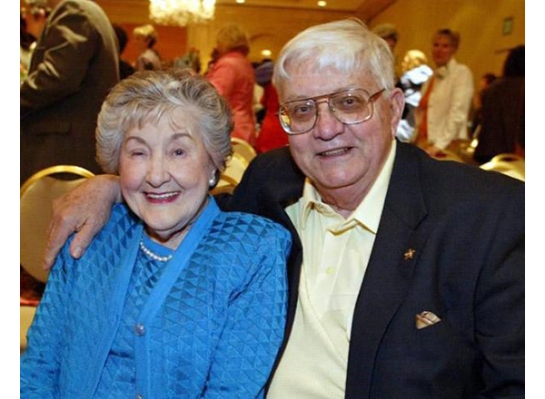By Tom Demerly for tomdemerly.com

Russ Gibb with Dearborn retail maven and girlfriend Alberta Muirhead in 2005
You are fortunate in your life if you’ve had one truly great teacher. I had Russ Gibb.
Equal parts Jedi Master and Morpheus-like oracle, Mr. Gibb (“Sir” to you and I) imparted sagacious wisdom, innovative premonition and traditional norms of respect. And he actually changed the media world. Russ Gibb was one of the most influential men of our century whom you’ve never heard of outside Dearborn. But Russ Gibb’s legacy has touched nearly every person on this planet.
He died last week in Dearborn at the age of 87.
Russ Gibb didn’t fit inside any established box, so he built his own. In this case, one that sits under your television and has cables running in and out of it. Gibb did not invent cable subscription television, just as Henry Ford did not invent the automobile or the Wright Brothers invent the airplane. But just as the Wright Brothers and Henry Ford did, Russ Gibb took a fledgling, under-integrated new technology and launched it on a trajectory that led to internet television and is still growing. Gibb was an early adopter of new media through cable subscription television. His pioneering program in Dearborn, Michigan included locally produced television programming on topics specific to the neighborhood. Our high school, Dearborn High School on Outer Drive, was likely one of the very first high schools- if not the first- in the world to have its own television studio. Mister Gibb either found the funding for our TV studio (much of it in grants from Sony Corporation and early cable providers) or simply paid for it himself.
If Russ Gibb’s work integrating municipalities and schools with cable television was his entire legacy, that would be impressive. But it is his mystic synergy of combining this new media- even before the Internet- with unprecedented access and an innate sense for publicity that provided Gibb with another miraculous talent: Hype.
Russ Gibb was a promoter. He was always promoting. Every lesson he taught, every idea he imparted, was the promotion of some idea; real or imagined, innovative or traditional. That he walked so readily between the conflicting worlds of emerging pop media and traditional institutional respect was entirely unique to Russ Gibb. Russ Gibb didn’t have to ask his students for respect. His devotion to education, wisdom, quirky charisma and clairvoyance of the future simply commanded respect.
Gibb was an entertainment alchemist. He conjured the chemistry of publicity that included elbow-grease promotion with implied spectacle. Where fact ended, Russ Gibb’s hype continued. Gibb is largely credited with one of the first and most prolific hype campaigns in media history, the “Paul McCartney is Dead” rumor. Gibb foisted the rumor from a caller to the radio station WKNR (“Keener 13!”) where he DJ’ed on October 12, 1969 according to a story by journalist Gary Graff for Billboard magazine. Gibb spun the idea into a worldwide conspiracy sensation that vaulted The Beatles to their highest ever trajectory on pop charts. According to Graff’s report for Billboard, “The whole thing just exploded”. Gibb told Billboard, “The phones were ringing off the hook. People were calling with their own clues. It was non-stop.” Gibb laughed as he remembered the station’s owner telling him, “Whatever you’re doing, just keep doing it.” He even called Eric Clapton, his musician friend in England, to ask if he knew anything about the rumor. Gibb told reporter Graff that Clapton said, “Come to think of it, I haven’t seen Paul for awhile…” Clapton went on to say, “It was really a phenomenon. For a while, it seemed like it might really be true.”

Russ Gibb DJ’ing in his early years.
When he wasn’t promoting tours, album releases and appearances by musical acts like Led Zeppelin, Alice Cooper, Frank Zappa, Wayne Kramer and the MC5, Cream, The Who, Janis Joplin and many others, Russ Gibb was working on his own media venue, The Grande Ballroom. This iconic shrine of music was a flash-pot of live media evolution that predated the punk rock and new wave movement and helped bend the trajectory of modern pop music and media promotion.
Gibb did all this while, in his 8-4 work day, he transformed high school students into television executives, managers in the Big 3 automotive companies, media pioneers and child prodigies.
Classmates of mine at Dearborn High under Russ Gibb included automotive exec, connectivity innovator and owner of numerous patents Larry Cepuran. Ed Korcinski was a prodigy student of Gibb who graduated from Dearborn High early, then MIT with a degree in materials engineering and went on to become a Silicon Valley microchip innovator. Paul Streffen graduated from Mr. Gibb’s curriculum at Dearborn High and went to Sony Corporation where he worked his way up as a pioneer of new media under Gibb’s sponsorship. I learned how to write a headline, organize a news story, and, more importantly than anything else, learn that I had a voice I could develop and share around the world from Mr. Gibb.
Russ Gibb left this world with an eternal and vibrant gift, the gift of promotion and sensation, connectivity and empowerment before those things were buzzwords. While he quietly built and boosted a media revolution, loudly pitched the talents of others, and steadily worked to bolster his incredibly fortunate students to believe they could achieve greatness he remained almost entirely on the sideline, out of the spotlight, instead preferring to focus that blinding and emerging beam of sensation on others. Perhaps more than any one great innovation or media promotion, it is this humble generosity that is his greatest and most enduring legacy.